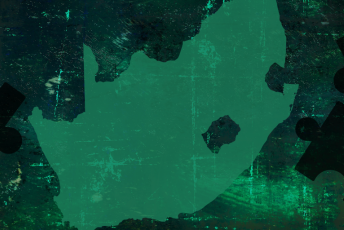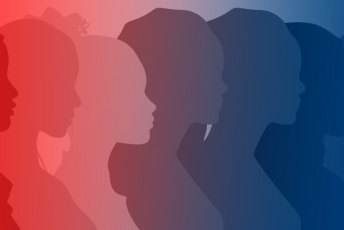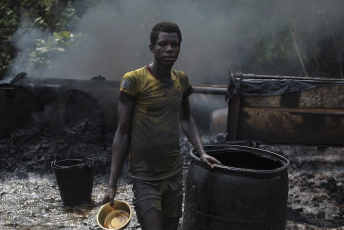Infants are the most innocent of victims in human trafficking. On 18 January 2021, the Cameroonian police opened an investigation into a network of traffickers who allegedly buy babies from the country and then sell them in the Democratic Republic of the Congo (DRC), Gabon, Equatorial Guinea, Nigeria and Chad.
Although Cameroon is seeing a rise in this crime, this is not the first time baby trading and trafficking has been linked to the country. Freedom Onuoha, a senior lecturer at the University of Nigeria, told ENACT that underground baby trading has been around for many years and is accompanied by an international dimension of racketeering.
In March 2014, Nigerian security officials intercepted and arrested two Cameroonian women at the Calabar Port as they tried to smuggle a seven-day-old girl into Cameroon. One of the women claimed the baby was delivered to her by a herbalist in Ondo State.
In March 2018, cases of baby trading were included in reported incidents of child trafficking in Cameroon’s southern town of Kiossi. The syndicate responsible is said to have extended its operations into neighbouring Gabon, Equatorial Guinea and Chad. These accounts position Cameroon as a source, transit and destination country for trafficked babies.
There are several drivers associated with baby trafficking in the region. Poverty, limited social and economic prospects and no social safeguards, particularly among teenage nursing mothers, results in high levels of vulnerability to being approached and exploited by baby traffickers. The Cameroonian police investigation confirmed that syndicate buyers from the DRC pay mothers US$2 000 for a fragile newborn and US$6 000 for a healthy infant older than three months.
The demand and supply sides of this criminal economy in Cameroon point to at least three scenarios: willing baby sellers, conscripted baby sellers and abducted or stolen babies who are traded in the underground economy. The first and second scenarios often involve vulnerable teenage mothers who are unable to care for their infants or sell them for financial gain.
In addition to the sellers, there is a range of actors along in the underground supply and demand chain of baby trading in the region. Cameroonians and foreign nationals operate and coordinate the criminal syndicates and networks. Evidence suggests that baby traders from the DRC maintain close contact with many underground cells in the coastal city of Douala.
A recent statement from an arrested baby trader in Cameroon detailed how traffickers from the DRC ply their trade with other syndicates through social media messaging. Cameroon-based syndicates record and send videos of poor teenage mothers to the traffickers in the DRC to register their willingness.
Other actors include medical experts, such as nurses, and babysitters who provide support and care for the pregnant girls and their infants in illegal shelters where the babies are kept in transit. The presence of these experts indicates the high value of babies that are traded.
At the end of the criminal value chain are the clients, mostly desperate childless couples. The propensity to buy babies among Cameroon’s affluent, childless couples mostly in urban centres is linked to an entrenched cultural stigma around infertility. Research indicates that this is the more benign scenario.
The direct victims of this crime are infants. In baby factories, as they are termed in Nigeria, studies indicate that the infants suffer immediate and long-term abuses. These include inadequate care, denial of birth registration, illegal adoption, and then depending on the circumstances, exposure to “health-related consequences, neglect, death, child labour, prostitution and other sexual abuse, organ trafficking and recruitment as child soldiers.”
Cameroon generally fares badly on the global monitor of trafficking in persons. According to the 2020 Office to Monitor and Combat Trafficking in Persons Report, the government of Cameroon does not fully meet the minimum standards for the elimination of trafficking in persons and has been downgraded to the Tier 2 Watch List.
The government has yet to publicise its standard operating procedures on victim identification and referral to law enforcement or first responders, nor has it passed draft anti-trafficking legislation from 2012. Authorities prosecuted 126 accused in 2018 and seven cases in 2019 respectively, and convicted even fewer traffickers in 2020.
There are no concerted efforts by the government of Cameroon to undertake a comprehensive national survey to assess the dimensions and prevalence of the crime, thus reliable statistics on baby trafficking in the country are non-existent. There are no dedicated agencies responsible for finding missing infants and tracking the associated black market operators. Limited funding and inadequate training mean that regional anti-trafficking task forces are a non-starter.
These developments shine a crude spotlight on the state’s seeming denial of the problem as the rising incidents of baby trafficking within and across the borders of Cameroon continue.
In addition, the civil society representatives that empower vulnerable and teenage pregnant women through economic and psycho-social support are invaluable partners to bolster the legislative and law enforcement efforts.
Extending this effort through media campaigns to raise awareness of the risks of fraudulent recruitment of vulnerable women into baby trafficking cells under the guise of socio-economic assistance is imperative.
Effective documentation and monitoring of orphanages and maternity homes by Cameroon’s inter-ministerial anti-trafficking committee and regional task forces would equally contribute to checking the illicit activities carried out by these centres, which sustain baby trafficking.
Lastly, infant trading has become a transnational organised crime that requires regional partnerships among Central Africa’s various governments. Cameroon’s government must work closely with neighbouring countries in joint intelligence sharing, surveillance and the development of bilateral legislation and protocols to ensure the prompt arrest and prosecution of baby traffickers in the region.
While these suggested remedies may appear obvious, pathways to the coordination of efforts are seldom straightforward. It is the political and fiscal will to stem this tide that will tell the story of Cameroon’s response and lend credence to these words from Nelson Mandela, “There can be no keener revelation of a society's soul than the way in which it treats its children.”
Oluwole Ojewale, Regional Organised Crime Observatory Coordinator – Central Africa







